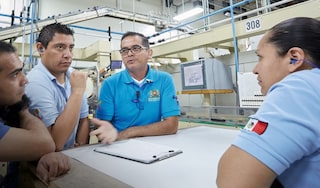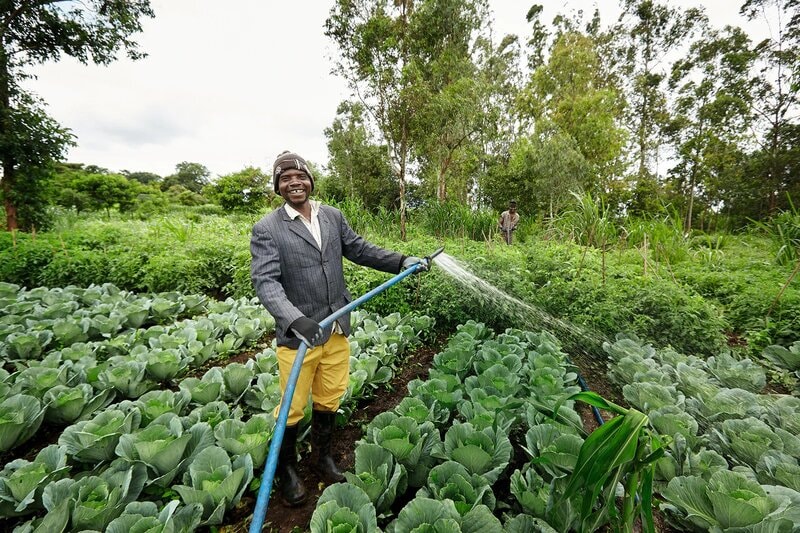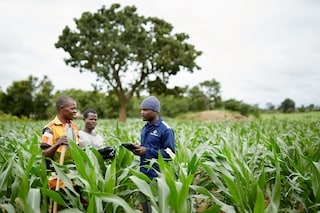Transforming our business can lead to new challenges for farmers in certain geographies as we foresee a gradual decrease in our tobacco leaf requirements, smoke-free products requiring half the quantity of tobacco or less, compared with cigarettes. Consequently, we are expanding the support we provide to farmers. While we have focused on Malawi in our previous reports, we have also been busy in Brazil, Colombia, Mozambique, Pakistan, and the Philippines.
-
73%
Of contracted tobacco farmers grow food crops for their own consumption, out of all the farmers growing alternative crops
-
400,000
Tons of food produced by contracted farmers through our crop diversification and suppliers' food programs in Malawi and Mozambique
In Malawi, a priority country for our diversification program, we signed a Memorandum of Understanding with Palladium International LLC (Palladium) to work together on selected initiatives. Palladium is a global impact firm implementing USAID’s “Feed the Future” program in Malawi. The aim is to create opportunities for smallholder farmers to diversify production away from tobacco and into other food crops, such as soybean or groundnuts. During 2018, we trialed various irrigation methods, including drips, sprinklers, and pivot systems fed from different water sources, such as dams, weirs, rivers, and boreholes pumped using solar or diesel pumps, to identify efficient, cost-effective solutions for farmers. To reduce post-harvest losses, 147,000 crop storage bags were distributed to all farmers in our food crop program to improve crop storage as a simple, low-cost way to reduce losses and insecticide use.
In Mozambique in late 2018, we, together with our supplier, initiated pilots of alternative crops with an international NGO, Business for Development, whose experience lies in assisting communities to rise out of poverty. In addition, 400 treadle pumps were distributed to smallholder farmers, providing them with a means to pump water from existing water sources to use on seedbeds and vegetable gardens. In addition, we distributed 6,000 crop storage bags.
In 2018, we launched our new Pakistan Diversification Program, where we initiated the Corn Support Program, providing hybrid corn seed and fertilizer to 200 farmers under our Integrated Production System (IPS). We expect yields of around 3,000 kg of corn on a 0.5-hectare plot, earning approximately USD 500 of additional income. In addition, Pea Support Program provides pea seeds to 64 farmers. A similar project is planned to help 75 farmers grow mushrooms. PMI will provide raw materials and training, and the marketing will be sponsored by the Hashoo Foundation.
Our Philippines “Tobacco Roadmap” aims to improve the competitiveness of farming communities by reducing poverty, promoting sustainability and improving farmers’ profitability and livelihood through diversified crops while enhancing the quality and competitiveness of Philippine tobacco. PMI is strengthening the Corn Support Program, launched in 2015 and annually supporting around 175 farmers. We are running a pilot to analyze the supply chain and identify inefficiencies related to transportation and post-harvest activities. Mobile threshers and grain dryers will be lent to farmers to potentially reduce post-harvest costs and generate additional income.
In Colombia, farmers are benefiting from diversification programs with food crops such as banana/plantain, corn, and garden vegetables. Approximately one-third of farmers inter-crop corn with tobacco, while we have distributed banana/plantain seeds to 256 farmers and provided 375 home garden vegetable seed kits. Additionally, we have assisted 50 farmers in setting up micro-fisheries and 100 farmers in setting up chicken cooperatives as an alternative source of income.
In Brazil, PMI has helped to set up home allotment gardens for rural families in 201 municipalities to grow native and exotic fruits. The project in partnership with Embrapa (the Brazilian Agricultural Research Corporation) provides each beneficiary with fruit tree saplings and farming inputs while the beneficiary provides land and labor for implementation and maintenance of the gardens. The project aims to expand, reaching new beneficiaries including not only farmers supplying to PMI, but also vulnerable communities. The project increases diversification activities, improves biodiversity in small farms through the planting of trees, improves family health by promoting healthier eating habits and generates additional income to the farmers, due to the possibility of selling surplus production.
As we expand our diversification efforts, monitoring and evaluation will allow us to assess the impact of the various initiatives on farmers and their families. We have compiled a household welfare survey, which was piloted in Malawi at the end of 2018 with a small sample of farmers. Rolling out this survey to a larger population will allow us to measure, on an annual basis, the impacts on household income, food security, and nutritional diversity.
Other 2018 case studies

Early adopter market Japan
Read more
Transformers in Greece
Read more
Human rights due diligence in Mexico


